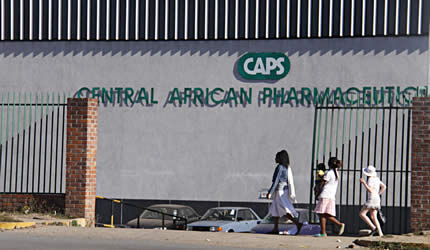Forced sales hit struggling firms
By Phillimon Mhlanga
HARARE – Zimbabwe’s beleaguered businesses have suffered from an unrelenting wave of forced sales, which have prevented them from realising true value from their assets to help extricate them from debts.

Analysts said the situation was likely to worsen this year due to a deepening economic crisis that has resulted in the closure of more companies.
The most immediate impact of the falling realisable asset value, through forced sales, is that it negatively affects a firm’s balance sheet, triggering financial instability which in the end threatens the whole economy with bankruptcy.
Forced sales value is the price at which an asset is sold in auction under forced sale conditions. While the trigger for the price contraction in forced sales has been massive debts accrued by companies after the economy dollarised in 2009, the plunge in asset prices is indicative of a deeper crisis exacerbated by the ailing economy.
It has become increasingly apparent, with evidence suggesting that this year more asset price contraction will be witnessed due to growing concern over the capacity of firms to repay debts.
Firms are faced with an increasing number of forced assets sales, sometimes called forced liquidation, in order to satisfy court judgments.
Most companies in Zimbabwe are insolvent, raising the spectre of liquidation due to failure to meet short term obligations to creditors.
According to precedents, the forced sale of assets has failed to attract the best market prices and in most cases, prices have not been enough to cover the amounts owed to creditors, even though the market value of assets that may have been offered to banks, for example, could have been three times the size of the loan.
“We are definitely going to see an increase in asset price contraction due to depressed economic levels and liquidity crisis,” economist, Brains Muchemwa, told the Financial Gazette.
“Most writ of executions to attach properties relate to loans procured between 2009 and 2012. So what we are finding is the delinquents’ levels are most likely to go up because non-performing loans have been increasing with very little liquidity to chase up these. We still have many disputes relating to loan contraction because of the slowness of the court processes,” said Muchemwa.
Several firms have already been affected. Among these are Steelnet, CAPS Holdings and David Whitehead. Manufacturing firm Steelnet’s Bulawayo-based division BMA was sold at forced value, highlighting the decline in realisable value.
Steelnet was put under liquidation last year, with its other units, Tube and Pipe and Hastt being sold.
CAPS Holdings, once the country’s largest drug manufacturing company, had government to thank after it reversed the sale of the company’s factory in Southerton Industrial area in Harare.
A Chinese investor had bought the CAPS complex for a song during a forced sale.
The Sheriff of the High Court ordered the sale of some of the pharmaceutical company’s assets to repay debts owed to CBZ Bank.
At its peak, CAPS Holdings used to manufacture 75 percent of essential drugs in the country and was once listed on the Zimbabwe Stock Exchange. The property, which was worth about US$6 million, had been auctioned for US$1,5 million.
CAPS Holdings’ majority shareholder and chairman, Fred Mtandah, appealed against the sale of the factory indicating they had made arrangements to pay the debts.
“We are appealing because we had made arrangements to pay some of our debts,” Mtandah said last year.
“The bank should have reversed the sale of the property because within two weeks I would have paid that US$1,5 million. Is there a motive for selling a property worth US$6 million for US$1,5 million?” he asked.
The assets which had been auctioned included a drug manufacturing plant, a three-storey administration block with 47 offices, a kitchen, a bar with a dispensary section, packaging sections, cold rooms, receiving bays, clinic and a guardroom.
Nearly 400 houses and stands belonging to various debtors countrywide have also been attached and auctioned since last year to clear some unpaid loans from financial institutions. Financial Gazette






